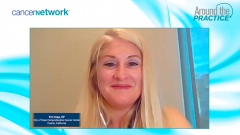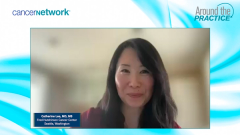
Second-Line Treatment Options for Steroid-Refractory Chronic GVHD
Experts discuss the second-line treatment options for chronic graft-vs-host disease when steroids fail, including ruxolitinib.
Episodes in this series

Nelson Chao, MD, MBA: This is a patient who is responding, and you taper, and he flares, and he flares in a bad way. You go up on the steroids. He's no longer responding. What would be your choice of the next line? Catherine, what would you use next?
Catherine Lee, MD, MS: Typically, I feel that most of us at the Hutch would move onto ruxolitinib. And any of you can correct me if you disagree that many providers across the country probably now are turning to ruxolitinib as their first second-line agent or in the steroid-refractory setting. Going back to the prior comment, we have these guidelines available of what defines steroid-refractory, steroid-dependentness. But these criteria were developed for the purpose of clinical trial enrollment and define eligibility, right? I can personally say I am not so strict in following these definitions when I call someone out as steroid-refractory or dependent. I think I'm a little bit quicker to move. I don't wait for two episodes of inability to taper before I call someone steroid-refractory. I might try one time, and if they fail one taper, I'm already moving to a second-line agent just so I can get them off steroids. I feel that most providers will probably move on to ruxolitinib unless there were concerning cytopenias or infections.
Nelson Chao, MD, MBA: Ruxolitinib shown in a stage three trial. It's approved as a second line, so it's a rational choice. It's a JAK inhibitor. It affects all the T cells as well as B cells. And so, biologically, it makes sense. I don't know if any of my colleagues would do something different. If the patient fails ruxolitinib, what would you do at Tulane?
Hana Safah, MD: There are available options also that may help the patients when they fail ruxolitinib. So now we have the Rantudil [acemetacin] and that can help. Some of my colleagues can use ibrutinib. I'm not a fan of ibrutinib as much, but it can. It's an option. It has been studied in patients and it did show benefit, especially if a patient has skin GvHD only. But ROK inhibitors are not bad. They are a very good option as a third line in patients who have failed JAK inhibitors at Tulane. I also continue ECP in these patients, especially skin GvHD. So that's something I either can add if I'm going to go to a third line, if the patient is not on ECP yet. Or just probably increase the frequency of for the [INAUDIBLE] while the patient is on treatment if they're failing the second-line therapy while adding a third line.
Erin Kopp, NP: The one thing for individuals who are not at a referral center that has access to clinical trials: We do identify, to your point, Dr. Lee, if a patient is starting to show that we think they're going to be steroid-refractory or dependent, working them up for clinical trials before we get there. Because clinical trials are such an important option to observe. I would say that to centers who are outside of that space. The referral process should start early because clinical trials require screening and slots and time there as well. We start that concurrently. If we're in a situation where ruxolitinib or any of our other second-line options are not panning out, we already have the clinical trial potentially available.
Nelson Chao, MD, MBA: Well said. I think as a group we really have to remember that clinical trials are still the go-to if we can. Ruxolitinib has tremendous responses; it works well. But if you look at the number of patients who are responding at the end of two to three years, it does drop off. It's not the total answer, but it clearly is the approved drug at this point. Belumosudil, which is a ROK2 inhibitor, I think the really interesting thing about that drug is the toxicity profile is really quite benign, which is useful in these patients who are otherwise so sick. We also use ibrutinib every now and then, but I think it's much harder to use in these patients with the side effects. This patient coasts through ruxolitinib. It goes through belumosudil. It goes through ibrutinib. Nothing works. I guess ECP is there as a fifth line. There's no clinical trial out there. Does anybody have a favorite?
Catherine Lee, MD, MS: I mean, I'll still use rituximab or low-dose weekly methotrexate to see if it helps. I've seen rituximab work in the very refractory setting for particularly oral chronic GVHD. I have not had so much luck with very advanced ocular or sclerotic chronic GvHD, although there are reports of rituximab having activity in that setting.
Hana Safah, MD: I think earlier you spoke of what other cells play a role in chronic GvHD. So it's not the T cells. And here we talk about, as Catherine is alluding to, maybe the B cells. So, yes, rituximab can be helpful. And sometimes in patients with severe skin, I do add rituximab early on. And in fact, there were some studies with the use of rituximab in chronic GvHD by Dr. Dabaja published, and they had some good results. So that's one. Also, maybe targeting the plasma cell in patients who have failed. I've used proteasome inhibitors with minor success, I would say. It doesn't work by itself, but it can add to the treatments available, whether it's rituximab or ECP. I've used ATG. Honestly, that's when the list becomes like, "OK, let's dump the tools we have and just pick what we can use." There is nothing that you can say definitely is going to work. Always, a clinical trial is going to be very important to have. But when they fail, whatever is approved and has been studied, then it becomes, "OK, what is available for us and what can the patient receive?" And it depends on the clinical status at this point and the comorbidities and the toxicities from the options available.
Nelson Chao, MD, MBA: Yeah, I think there's a trial with axatilimab, which is hitting the monocytes, which is just potentially another mechanism. So these are the things I think will be good to learn as we go along.
Newsletter
Stay up to date on recent advances in the multidisciplinary approach to cancer.





































